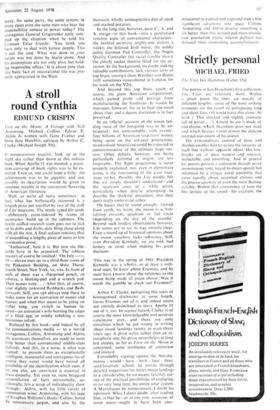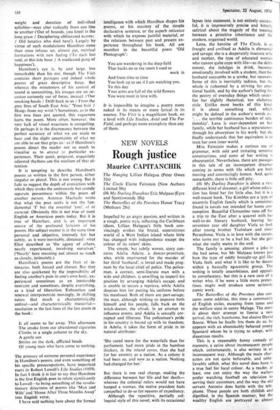Strictly personal
MICHAEL FRIED
The Visit lan Hamilton (Faber 15s) The poems in Ian Hamilton's first collection. The Visit, are relatively short. Within a given poem the lines are usually of different lengths: some of the most striking moments are the result of juxtaposing long and short lines (I) ssorld leave this alone/ At least / This shocked and slightly aromatic
tall of leaves Almost no use is made of end-rhyme, which Hamilton does not need and which besides would distort the delicate internal movement of his poems.
His extraordinary control of pact. and rhythm enables him to secure the integrity of each line without apparent effort. His line- breaks are at once natural and musical. ineluctable and unsettling. And in general his poems possess a consistent though never monotonous tone, keyed to direct speech but informed by a unique aural sensibility that cares equally about accentual stresses and the precise quantity of even the most fleeting syllable. Within that consistency of tone the tine texture of the sound—for example, the weight and duration of individual syllables—may alter radically from one line to another (`Out of bounds, you kneel in the long grass / Deciphering obliterated names: / Old lunatics who died here'). Largely by virtue of such modulations Hamilton more
than once infuses set, almost pat, metrical formations with new feeling (`To each lost soul, at this late hour / A medicated pang of happiness').
Hamilton's eye is, by and large, less remarkable than his ear, though The Visit contains short passages and indeed whole poems of great descriptive force. But whereas the minuteness of his control of sound is unremitting, his images are on oc- casion curiously out of focus, inexact. (`Our smoking heads / Drift back to us / From the grey fires of South East Asia.' Your hair / Hangs from my wrist.') Sometimes, as in the first two lines just quoted, this vagueness hurts the poem. More often, however, the very lack of visual exactness is compelling. Or perhaps it is the discrepancy between the perfect accuracy of what we are made to hear and the slight uncertainty of what we are able to see that grips us: as if Hamilton's poems direct the reader not so much to visualise as to attend to particular ex- periences. Their quiet, poignant, exquisitely adjusted rhythms are the medium of that at- tention.
It is tempting to describe Hamilton's poems as written in the first person, either singular or plural. This is not wrong. But it fails to suggest the depth of conviction with which they evoke the undramatic but acutely separate presentness within the poem of another person. Antonio Machado wrote that what the poet seeks is not the fun- damental 'I' but the essential 'you'. el to esencial. Obviously this is not true of most English or American poets today. But it is true of Hamilton, and is an important source of the profound lyricism of his poems. His subject matter is at the same time personal and objective, intensely felt but subtly, as it were inevitably. distanced: what Eliot described as 'the agony of others, nearly experienced, involving ourselves.' ('Nearly' here meaning not almost so much as closely, intimately.)
Hamilton's poems are the fruit of in- timacies, both forced and chosen. But they are also quickened by the impossibility of feeling another's pain in one's own body, ex- perienced sometimes as an intolerable restraint and sometimes, despite everything, as a kind of liberation. Exhaustion and renewal interpenetrate movingly, in shifting ratios that reach a characteristically unfinal—and characteristically masterful— resolution in the last lines of the last poem in the book : It all seems so far away. This afternoon The smoke from our abandoned cigarettes Climbs in a single column to the sky. A gentle sun Smiles on the dark, afflicted heads Of young men who have come to nothing.
The primacy of extreme personal experience in Hamilton's poems, and even something of his specific preoccupations, have important roots in Robert Lowell's Life Studies (1959). In fact I think it is fair to say that Hamilton is the first English poet to relate significantly to Lowell—to bring something of the revolu- tionary directness of poems like 'Man and Wife' and 'Home After Three Months Away' into English verse.
I have said nothing here about the formal intelligence with which Hamilton shapes his poems, or his mastery of the simple declarative sentence, or the superb reticence with which he exposes painful material, or the relations between past and present ex- perience throughout his book. All are manifest in the beautiful poem 'Old Photograph': You are wandering in the deep field That backs on to the room I used to work in And from time to time You look up to see if I am watching you. To this day Your arms are full of the wild flowers You were most in love with.
It is impossible to imagine a poetry more naked in its means or more lyrical in its essence. The Visit is a magnificent book, on a level with Life Studies, Ariel and The Far Field, and perhaps more exemplary than any of them.































 Previous page
Previous page